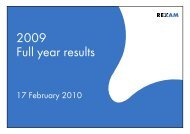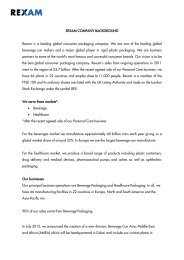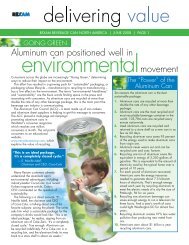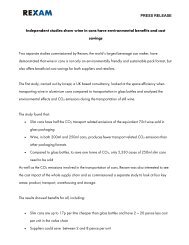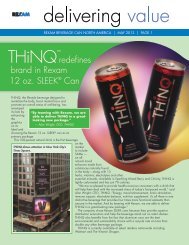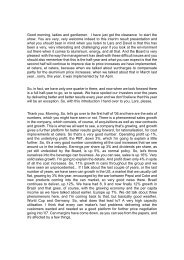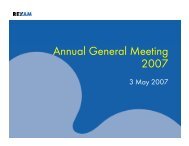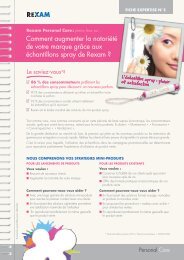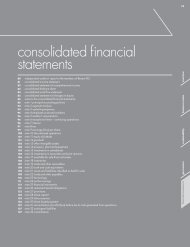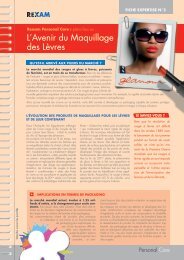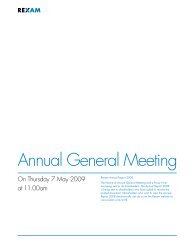All case studies
All case studies
All case studies
Create successful ePaper yourself
Turn your PDF publications into a flip-book with our unique Google optimized e-Paper software.
ENVIRONMENT<br />
Working with steel suppliers to<br />
reduce waste<br />
We have launched a number of projects in<br />
relation to the steel we use to manufacture<br />
beverage cans. Each project is different and<br />
has varying impacts.<br />
A common theme through them all is the<br />
minimisation of scrap steel or coil packaging<br />
going to landfill sites around the world,<br />
together with the additional benefits of the<br />
reduction of transport required.<br />
”By working with<br />
suppliers we share<br />
the benefits with<br />
the whole industry”<br />
Maximising steel coil weights<br />
We aim to maximise the steel coil weights<br />
used within our sites to help achieve the<br />
following environmental benefits:<br />
• Less fuel and trucks used to deliver the<br />
coils.<br />
• Less packaging required (wood, metal and<br />
plastic).<br />
• Less use of forked lift trucks at our site<br />
reducing fuel consumption.<br />
Three of our major steel suppliers have been<br />
asked to look at producing the maximum<br />
responsibility<br />
<strong>case</strong> study<br />
possible coil weights within their production<br />
constraints that can be processed at our steel<br />
plants within their coil handling capabilities.<br />
The project is progressing well despite the<br />
constraints experienced by the suppliers in<br />
the restriction of maximum ‘payloads’ that<br />
can be transported by truck within Europe.<br />
Reducing packaging<br />
We also have a project looking at reducing<br />
the amount of packaging used by suppliers<br />
on their steel coils arriving at our sites.<br />
The constraint on this project is to not<br />
compromise the level of protection required<br />
for the coils in transit, but to establish the<br />
lowest acceptable level of packaging<br />
necessary to prevent damage to steel whilst<br />
being transported and to protect it against<br />
the weather (steel rusts!). The environmental<br />
benefits for this are less packaging and less<br />
packaging disposal required (waste).<br />
Laser welded coils<br />
Steel coils are traditionally welded by<br />
conventional non-laser methods. When coils<br />
of this nature are run at our sites, the line is<br />
stopped and the section of coil containing the<br />
weld is cut out – usually two or so meters.<br />
With the introduction of laser welded coils,<br />
our lines have detectors that identify the laser<br />
weld position on the coil and alert line<br />
operators who then momentarily stop the line<br />
to sweep out the can cups formed at the line<br />
of the weld with subsequent minimal loss of<br />
metal.<br />
The benefits here are:<br />
WASTE MANAGEMENT<br />
• Easier maximisation of coil weights as<br />
Rexam allows a higher ratio of laser coil<br />
welds than “conventional” welds. The<br />
benefits of higher coils weights are listed<br />
earlier.<br />
• More steel per coil is used to make cans.<br />
This means that there is better use of the<br />
energy used to produce the coil.<br />
• Less scrap is produced during the process.<br />
These changes per coil may not seem that<br />
much, but when you consider the number of<br />
coils used (over 12,000 p.a.) and the<br />
number of steel cans produced (over 4 billion<br />
p.a.), the impacts are significant.



